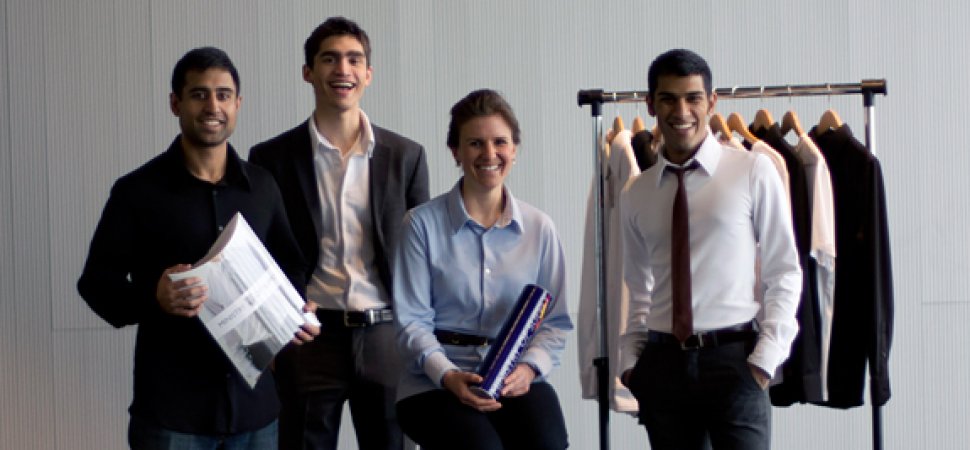Author: Martin Trust Center
by Dylan Walsh
Kit Hickey spent five years in investment banking wearing the kinds of clothes that met dress code but suffered on comfort: stiff, restrictive, not breathable. As an outdoor enthusiast, she was particularly aware of this shortcoming. She headed to the MIT Sloan School of Management in 2011 to close the gap between rock climbing pants and business slacks, running shirts and standard blouses.
“I met Aman Advani within the first few days of school,” she said. He, like Hickey, lamented how poorly business attire performed anywhere outside of air-conditioned offices. They began prospecting ideas for a new venture, developing a business plan, even churning out low-tech prototypes. Hickey headed to the Martin Trust Center and spoke with its managing director, Bill Aulet, who pointed her to Gihan Amarasiriwardena and Kevin Rustagi, two like-minded undergraduates with degrees in chemical engineering and mechanical engineering. Together, the four founded Ministry of Supply, a company that merges the fashion standards of dress clothes with the technology of performance apparel.
Hickey and her co-founders moved quickly. “We had tons of conversations with Entrepreneurs in Residence, pricing professors, entrepreneurship professors—with anyone we could,” she said. “The Trust Center has so many resources, and we took advantage of them.” They honed product ideas and strategy through classes like New Enterprises, in which Ministry of Supply served as the centerpiece of a semester-long project; they pressure-tested team dynamics in accelerators at the Trust Center—both StartIAP (now MIT fuse), a three-week program during January break, and the Founders’ Skills Accelerator (now MIT delta v), which runs throughout the summer.
But perhaps the most valuable contribution of the Center, beyond classes, conversations, and accelerators, was how it forced Hickey and her partners to turn outward. Yes, the internal mechanics of the company were essential, but equally essential were the opinions of future customers.
“One thing that the Trust Center does better than anyone in the world is to take a consumer-centric approach,” Hickey said. Ministry of Supply spent countless hours interviewing potential customers. Upon hearing recurrent complaints about men’s dress shirts, they dove into the technical questions. “There had been no innovation since non-iron shirts 30 years ago,” Hickey said. “If we were going to focus on one product, here was one that really stood out.” The company built three prototypes with different materials and tested each one with consumers. Feedback on their products generated a series of foundational insights. More than 20 iterations later, they had their first dress shirt ready to sell.
“A lot of companies fail because they don’t take this work seriously,” Hickey said. “Coming through the Trust Center will force you to understand things from the customers’ point of view, to have empathy.” (Even today, the Ministry of Supply labels employees “empathic inventors.”)
After raising almost $430K on Kickstarter in summer 2012, making the company the highest-funded fashion Kickstarter of the time, Ministry of Supply launched its online store and Boston showroom. Since then, the company has raised almost $9 million of funding, opened eight stores across the country, and hired 50 employees. They sell everything from socks to suits, with clothing lines for both men and women. At its Boston flagship store in March of 2017, the company introduced blazers manufactured on-demand by a 3D printer—essentially reinventing the fashion supply chain.
Hickey left Ministry of Supply last April and returned to the Trust Center as an Entrepreneur in Residence. In this role she provides guidance for students across campus who are forming new ventures, whether undergrads, business students, or doctoral candidates; she’s now sitting on the other side of the table from her student years at Sloan. She also teaches two to three classes per semester.
“I love being back at MIT,” she said. “Many of the Entrepreneurs in Residence motivated me when I was a student, and now I’m equally motivated by meeting with these people who want to change the world, who are so passionate about the companies they’re working on.” Hickey is particularly excited about teaching “Dilemmas in Founding New Ventures,” a class she designed based on the people-related challenges that entrepreneurs so often face, but equally often ignore. How do you hire the right people? When do you fire? How do you manage a high-performing team? “This was something I struggled with, along with almost all of my classmates who started companies. We’re now making that into a learning opportunity for MIT students and entrepreneurs so that they can effectively build organizations well beyond their time at MIT.”




Follow